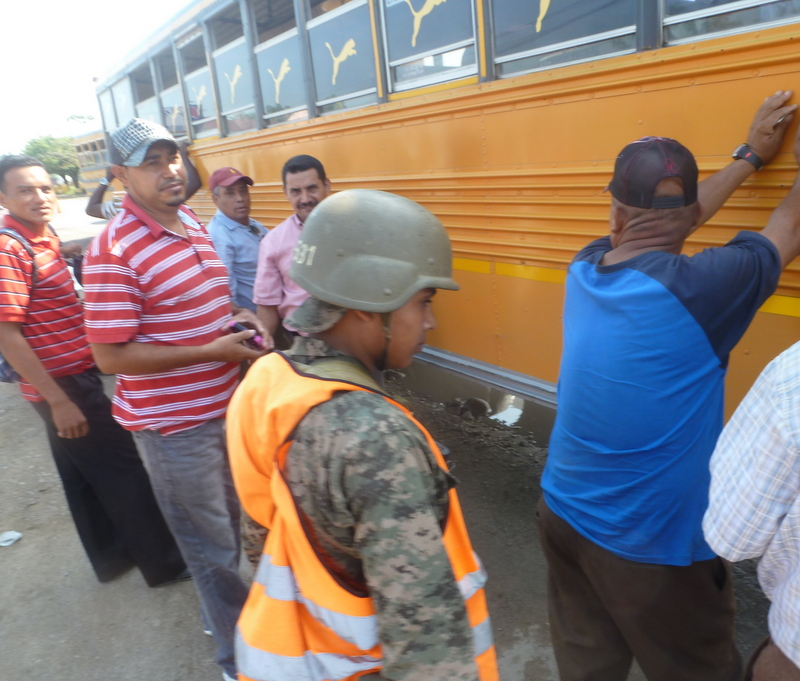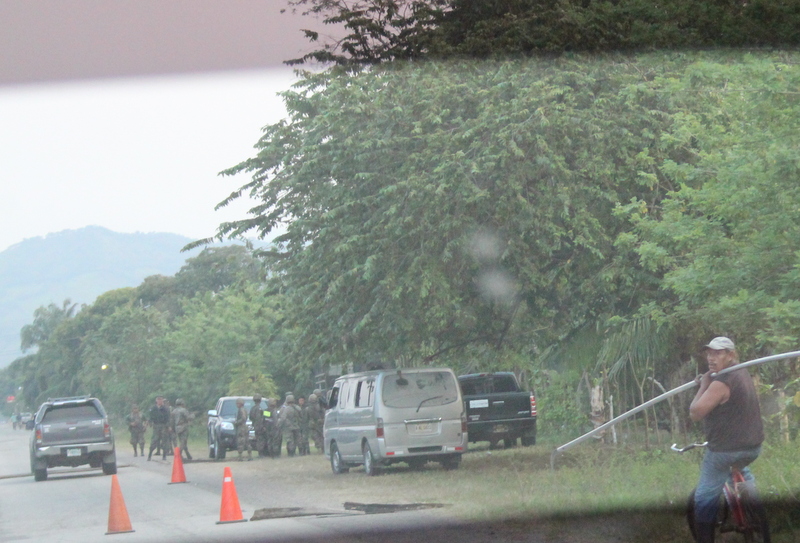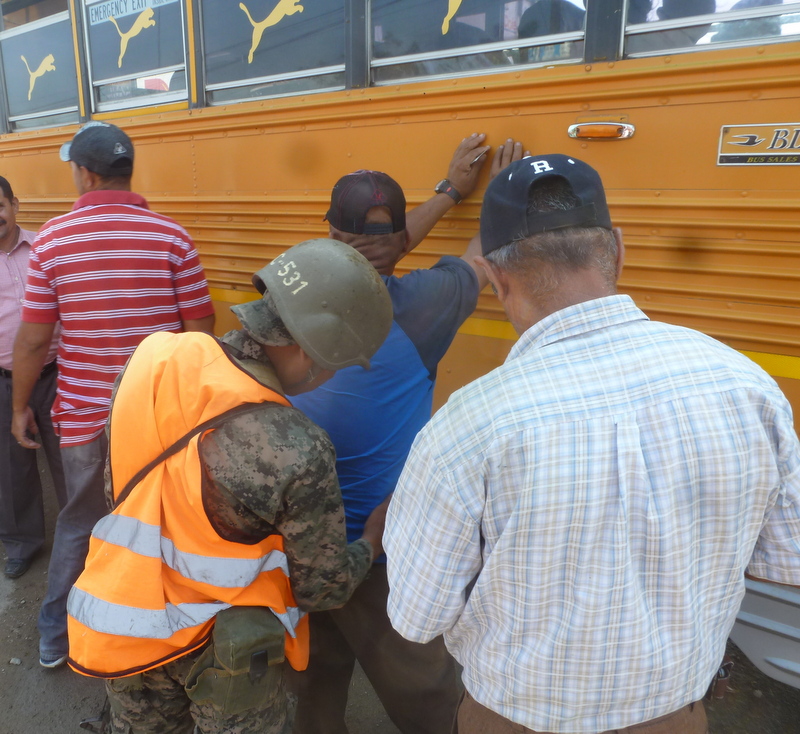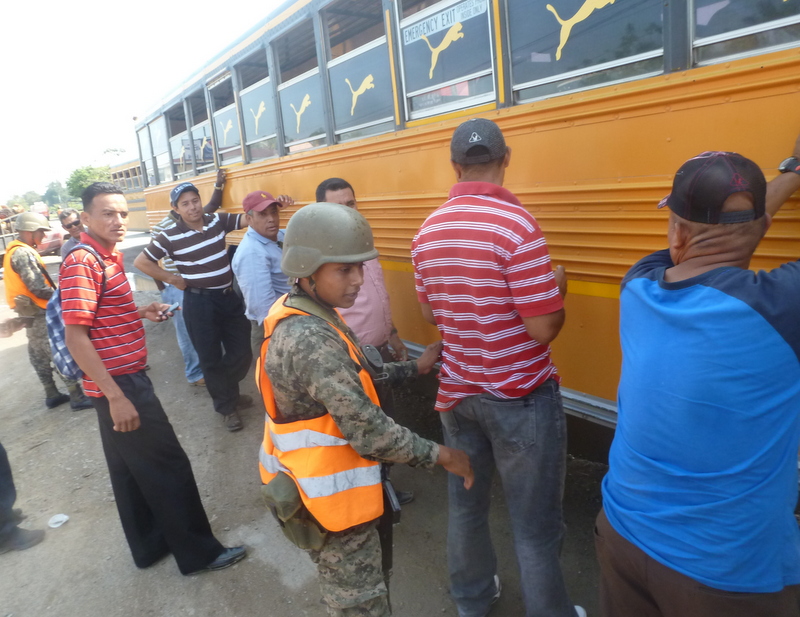VALLECITO, COLON, HONDURAS-It was November of 2012 when The Nation Report last reported from on location of the Bajo Aguan region in northern Honduras. In this region that has seen now over a hundred in a surge of targeted assassinations of community leaders, land rights activists and the attorneys who represent them, journalists covering the repression, members of the LGBTQ community, teachers, union leaders, youth and women, the Bajo Aguan remains a place of focus among human rights organizations and commissions.
A swell in police checkpoints was documented by The Nation Report as well as an increase in officers attending to those checkpoints. Across the country, community members are reporting that the military is encroaching upon their communities “uninvited”. Such is the community of Rio Blanco where the people there are currently blocking off access roads to fight a hydroelectric dam-the Agua Zarca-a project that the community has not authorized, the operation of which they have shut down demanding the removal of construction equipment.

top 3 photos: courtesy of Greg McCain for The Nation Report
Passengers are removed from a public bus and forced to undergo a pat down search. Belongings are searched as well. Searches are regular occurrences.
Greg McCain is a human rights observer for the organizations Alliance for Global Justice and La Voz de Los de Abajo and has been living in and observing the human rights crisis in Honduras for nearly a year now. McCain spoke to The Nation Report today to talk about the changes he has seen in Honduras over the past year:
McCain: Definitely the militarization of the country has gotten worse. The military is occupying both Tegucigalpa and San Pedro Sula doing basically the work that the police are supposed to be doing. And they’ve been in the Aguan since and it seems to me that the number of military checkpoints between Trujillo and Tacoa are a lot more than what they have been. I’ve been in a few buses where they stop and one soldier will board the bus and tell all the men to get off and the women have to stay on the bus. Then you leave your belongings on the bus and they go through all the belongings. A couple of times they’ve done body pat downs of some guys-spread eagle against the bus. Since I’m a Gringo I guess I have the white privilege of not being patted down so I’m just watching this and taking pictures and asking, ‘Why are you guys doing this? What are you looking for?’ I mean these guys are like sixteen, well they’re probably eighteen to twenty years old but they look like they’re fourteen. And they basically can’t tell me [why they do this] they’re saying well we’re just doing what were supposed to do. And they’re basically looking at IDs if somebody doesn’t have an ID or has an expired ID I guess they would take them off to I don’t know where, I guess the police station.
Gaintan: So is a Honduran required to carry an ID all the time?
McCain: Yeah you have to have an ID or you’re taken to the police station. Until you prove [who you are] or why you’re here. By law you have to have an ID on you. Also supposedly they’re looking for drugs and AK47s or pistols or whatever they can find. Especially in the Aguan since they passed the decree. Congress passed the decree saying that in the entire department of Colon nobody can have, no citizen can have any arm whatsoever, any kind of gun or pistol.
On August 1, 2012 Honduran congress passed a decree that aimed to disarm the public in the department of Colon. Gun permits were cancelled and since, random searches throughout the Bajo Aguan region are not uncommon.
McCain: Although of course Facusse’s security guards go up and down the street with their shotguns at the ready all day long. I see it. Every day I see truckloads of security guards and they’re holding [arms]. They’re not on Facusse’s property. They’re up and down the public streets. Colonel Alfaro from Xatruch 3 of the Honduran army boasts about how they’ve disarmed the Hondurans. They collected in the first month that they got this decree, they captured 400. He didn’t describe what they were, but just 400 arms and it averages fourteen a month since then. I don’t know what that means or how he captured [them]. I don’t know if he did it by this bus thing or what, by the pat downs, I don’t know. I can’t imagine that. But yeah it’s worse in that sense. It definitely feels, the Aguan feels like martial law because of the military presence. And on top of the military checkpoints there are also the police checkpoints. I’ve been on a bus that’s been stopped which normally from Trujillo to Tocoa is a 45 minute [bus ride]. It’s taken me an hour and a half or longer becuase the bus was stopped at every single checkpoint. And the same [thing happens] except the police don’t make everybody get off but they’ll board the bus and they’ll look.
And then just the deaths of the campesinos looks to me like they’re increasing since the beginning of the year. Like before in 2012 it was averaging maybe 2-3 campesino deaths a month; sometimes it was more sometimes less. Now it’s looking like at the minimum it’s four, sometime six a month. And there’s been targeting of the MUCA leadership. Amazing luck they’ve just left a place where then a truckload of heavily armed people have come looking for them. And then La Prensa, the local newspaper, the daily newspaper that’s owned by one of the golpista families has been running this series of articles that basically just criminalizes the campesino leadership. It’s like these very vague [references]. [The articles say] there’s these armed groups of men training somewhere you know on some finca-somebodys palm plantation some kind of military training. Alfaro alludes to Nicaraguan military training them. [Then the campesinos] go to terrorize Facusse’s security guards and then terrorize the military. [The campesinos] are terrorizing the police so that they can run the security off and then the campesinos can come in, steal all the palm fruit and then somehow there’s some transaction later. That’s like the most far-fetched [story]. And why are there so many campesinos being killed? If Facusse’s security guards are being terrorized, why is it the campesinos are the ones being killed off? There’s a very small, small, small percentage of security guards who are reported being killed and usually that ends up being infighting between the guards. But since the coup there have been over a hundred campesinos murdered by these assassins.
Gynther: I have been in Honduras since July. First, I was an accompanier and now we’re working on a project called ” Telling the Stories of Honduras” that aims at bringing the reality faced by people and human rights defenders and social movements in Honduras to the attention of people in the U.S. and also realizing that the U.S. policy has a tremendous impact on the reality in Honduras.
Gaintain: Can you talk about that policy?
Gynther: In June of 2009, the democratically elected president of Honduras Mel Zelaya was removed from the country in a military coup that was led by graduates of the School of the Americas. He was taken out of the country in the early morning hours in his pajamas. General Romeo Vasquez who is a graduate of the School of the Americas was one of the main plotters of the coup. And the coup unleashed a whole series of repression, especially repression against people who were standing up for rule of law, standing up for human rights, standing up for the rights of the Honduran people. So since the coup, violence in the country has severely intensified. Many social movement leaders and those who work for human rights have been assassinated. There’s very targeted murders and assassiantions as well as targeted threats of people who are standing up for justice. The militarization has severely increased. The U.S. sends millions and millions of dollars of military aid and police aid to Honduras and both the military and the police have been implicated in human rights abuses in Honduras. The police are widely known and widely accused of death squads. There was a very important article that came out in the AP not too long ago where it detailed some of the death squad activity of the police in Honduras. And in terms of the military there have also been tremendous abuses. For instance in May, fifteen year old Ebed Yanes was shot after he drove a motorcycle through a military checkpoint. The unit that was responsible for the death was specially vetted and trained by the U.S. and funded.

photo: Tiburcia Vidal/The Nation Report
The next day The Nation Report received word of a military raid on the community of Laureles just minutes away from this spot along the only highway that crosses from west to east.
Gaintan: There wasn’t even going to be an investigation, it was his father who pursued that investigation.
Gynther: Exactly, his father, once his son never came back, went out to find out what had happened and found his son. He investigated the case and even had to drive the Honduran prosecutors around in his cars because the Honduran prosecution didn’t have vehicles to get the case to move forward. It still has a long way to go. Unfortunately impunity is very, very strong in Honduras and so it’s very, very, very rare that anybody responsible for human rights abuses is ever brought to justice.
There’s another case that happened last May. In May 2012 [U.S.] State Department helicopters were flying over the Patuca River in the Mosquitia and one of the helicopters opened fire on people in a passenger boat below and four people died; completely innocent passengers in a boat in the mosquitia region. It’s very common, the mode of travel is boats. And so they were just traveling as civilians. So the people who have been injured are still dealing with their injuries and there has been no responsibility on the part of the Honduran government or the U.S. government for their injuries, for the medical costs that they have to face. One of them is now a sixteen year-old boy and his hand would have had to been amputated if not for a human rights organization here in Honduras COFADEH that helped him to get surgery on his hand. And he still, it’s almost a year later, he is still going almost daily to physical therapy in the hospital dealing with trying to regain use of his hand. The U.S. government with State Department helicopters, there were ten U.S. Drug Enforcement Agency officials involved in the incident. There’s been no responsibility taken on the part of the U.S. for not only what happened and the murders but also for the ongoing medical care of the people who were hurt. Another woman who was hurt had basically high-caliber bullets pierce her thighs and is again struggling with immense pain. She can’t work, she can barely walk, and again has multiple medical needs and has to look for the money for them. Another man who was injured in the incident is also severely injured and needs to have future medical needs and his father has had to borrow money to try to get him the medical care he needs. So it’s just appalling that this happened in which these four innocent people were murdered and others were injured.
Gaintan: Plus the bullets just missed small, small children.
Gynther: Uh hum. There were many people in this passenger boat there. I think there were about sixteen people in this passenger boat and not only were they shot at with high caliber bullets but then afterward when it was obvious that they were civilians there wasn’t much care taken to them.
You know one of the exhumations that happened was done very, very sloppily. People who witnessed it [said] evidence was clearly lost. The Honduran government has done an investigation but it is, it even contradicts another investigation done by the Honduran government. You know they’re very sloppily done and aren’t really getting towards any sort of justice or root of the matter. And the U.S. has failed to do any sort of investigation despite the fact that fifty-eight Congresspeople recently wrote a letter calling on the U.S. to investigate what happened. But the U.S. has not taken responsibility for its role at all.
When people are injured they just have no capacity to work.
Another area of the country where the human rights situation is extremely severe is the lower Aguan Valley which is in the area of Colon, Honduras. And in this area there have been around one-hundred campesinos who have been murdered since the coup. Many of those deaths are accused to be carried out by the security guards of Miguel Facusse which is one of the largest landowners in Honduras as well as the state security forces for instance the police and military. And there’s widely said to be a lot of collusion between the private security guards of these large powerful landowners and figures in Honduras as well as the military and police in the area. Theres the Xatruch 3 Battalion which is led by another School of the Americas graduate, Colonel Alfaro which is operating the region and is currently waging a media campaign against the leadership of the Unified Campesino Movement of the Aguan-MUCA. There are all these allegations trying to make it seem as if the campesinos are armed or that there are armed groups of campesinos when in reality the campesinos are the ones who have faced tremendous repression and they have been standing up for their right to land.
Gaintan: And they’ve been doing it peacefully.
Gynther: And the campesinos…we’ve visited many campesino cooperatives [where] they’re trying to harvest palm to basically support their families. In many ways it’s a struggle between land to be controlled by two or three powerful businessmen in the country or to be controlled by cooperatives or small businesses of campesinos who then can harvest the palm and have that money go to take care of their families to support communities. So it’s really two different development “models” that are at play here. It’s very violent.
Refufia Gaintan/The Nation Report

